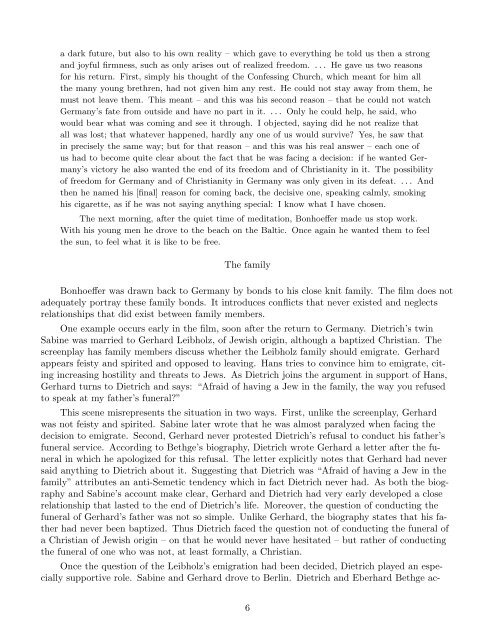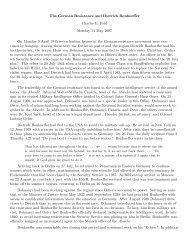Dietrich Bonhoeffer a discussion of the film Bonhoeffer: Agent of ...
Dietrich Bonhoeffer a discussion of the film Bonhoeffer: Agent of ...
Dietrich Bonhoeffer a discussion of the film Bonhoeffer: Agent of ...
You also want an ePaper? Increase the reach of your titles
YUMPU automatically turns print PDFs into web optimized ePapers that Google loves.
a dark future, but also to his own reality – which gave to everything he told us <strong>the</strong>n a strong<br />
and joyful firmness, such as only arises out <strong>of</strong> realized freedom. . . . He gave us two reasons<br />
for his return. First, simply his thought <strong>of</strong> <strong>the</strong> Confessing Church, which meant for him all<br />
<strong>the</strong> many young brethren, had not given him any rest. He could not stay away from <strong>the</strong>m, he<br />
must not leave <strong>the</strong>m. This meant – and this was his second reason – that he could not watch<br />
Germany’s fate from outside and have no part in it. . . . Only he could help, he said, who<br />
would bear what was coming and see it through. I objected, saying did he not realize that<br />
all was lost; that whatever happened, hardly any one <strong>of</strong> us would survive? Yes, he saw that<br />
in precisely <strong>the</strong> same way; but for that reason – and this was his real answer – each one <strong>of</strong><br />
us had to become quite clear about <strong>the</strong> fact that he was facing a decision: if he wanted Germany’s<br />
victory he also wanted <strong>the</strong> end <strong>of</strong> its freedom and <strong>of</strong> Christianity in it. The possibility<br />
<strong>of</strong> freedom for Germany and <strong>of</strong> Christianity in Germany was only given in its defeat. . . . And<br />
<strong>the</strong>n he named his [final] reason for coming back, <strong>the</strong> decisive one, speaking calmly, smoking<br />
his cigarette, as if he was not saying anything special: I know what I have chosen.<br />
The next morning, after <strong>the</strong> quiet time <strong>of</strong> meditation, <strong>Bonhoeffer</strong> made us stop work.<br />
With his young men he drove to <strong>the</strong> beach on <strong>the</strong> Baltic. Once again he wanted <strong>the</strong>m to feel<br />
<strong>the</strong> sun, to feel what it is like to be free.<br />
The family<br />
<strong>Bonhoeffer</strong> was drawn back to Germany by bonds to his close knit family. The <strong>film</strong> does not<br />
adequately portray <strong>the</strong>se family bonds. It introduces conflicts that never existed and neglects<br />
relationships that did exist between family members.<br />
One example occurs early in <strong>the</strong> <strong>film</strong>, soon after <strong>the</strong> return to Germany. <strong>Dietrich</strong>’s twin<br />
Sabine was married to Gerhard Leibholz, <strong>of</strong> Jewish origin, although a baptized Christian. The<br />
screenplay has family members discuss whe<strong>the</strong>r <strong>the</strong> Leibholz family should emigrate. Gerhard<br />
appears feisty and spirited and opposed to leaving. Hans tries to convince him to emigrate, citing<br />
increasing hostility and threats to Jews. As <strong>Dietrich</strong> joins <strong>the</strong> argument in support <strong>of</strong> Hans,<br />
Gerhard turns to <strong>Dietrich</strong> and says: “Afraid <strong>of</strong> having a Jew in <strong>the</strong> family, <strong>the</strong> way you refused<br />
to speak at my fa<strong>the</strong>r’s funeral?”<br />
This scene misrepresents <strong>the</strong> situation in two ways. First, unlike <strong>the</strong> screenplay, Gerhard<br />
was not feisty and spirited. Sabine later wrote that he was almost paralyzed when facing <strong>the</strong><br />
decision to emigrate. Second, Gerhard never protested <strong>Dietrich</strong>’s refusal to conduct his fa<strong>the</strong>r’s<br />
funeral service. According to Bethge’s biography, <strong>Dietrich</strong> wrote Gerhard a letter after <strong>the</strong> funeral<br />
in which he apologized for this refusal. The letter explicitly notes that Gerhard had never<br />
said anything to <strong>Dietrich</strong> about it. Suggesting that <strong>Dietrich</strong> was “Afraid <strong>of</strong> having a Jew in <strong>the</strong><br />
family” attributes an anti-Semetic tendency which in fact <strong>Dietrich</strong> never had. As both <strong>the</strong> biography<br />
and Sabine’s account make clear, Gerhard and <strong>Dietrich</strong> had very early developed a close<br />
relationship that lasted to <strong>the</strong> end <strong>of</strong> <strong>Dietrich</strong>’s life. Moreover, <strong>the</strong> question <strong>of</strong> conducting <strong>the</strong><br />
funeral <strong>of</strong> Gerhard’s fa<strong>the</strong>r was not so simple. Unlike Gerhard, <strong>the</strong> biography states that his fa<strong>the</strong>r<br />
had never been baptized. Thus <strong>Dietrich</strong> faced <strong>the</strong> question not <strong>of</strong> conducting <strong>the</strong> funeral <strong>of</strong><br />
a Christian <strong>of</strong> Jewish origin – on that he would never have hesitated – but ra<strong>the</strong>r <strong>of</strong> conducting<br />
<strong>the</strong> funeral <strong>of</strong> one who was not, at least formally, a Christian.<br />
Once <strong>the</strong> question <strong>of</strong> <strong>the</strong> Leibholz’s emigration had been decided, <strong>Dietrich</strong> played an especially<br />
supportive role. Sabine and Gerhard drove to Berlin. <strong>Dietrich</strong> and Eberhard Bethge ac-<br />
6



